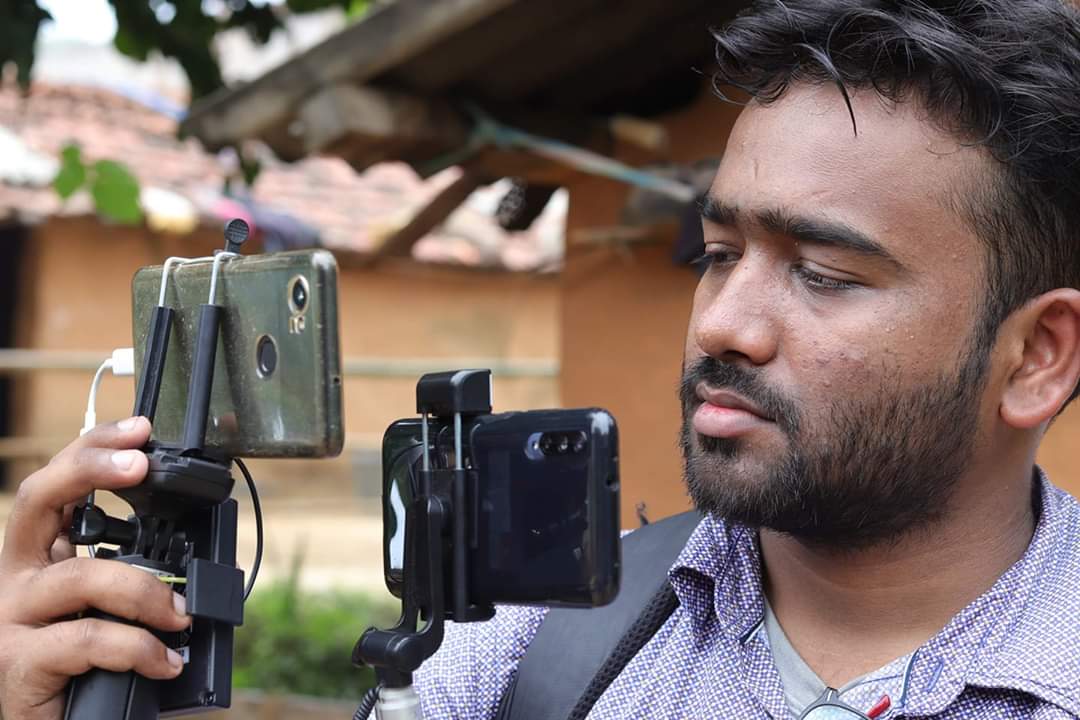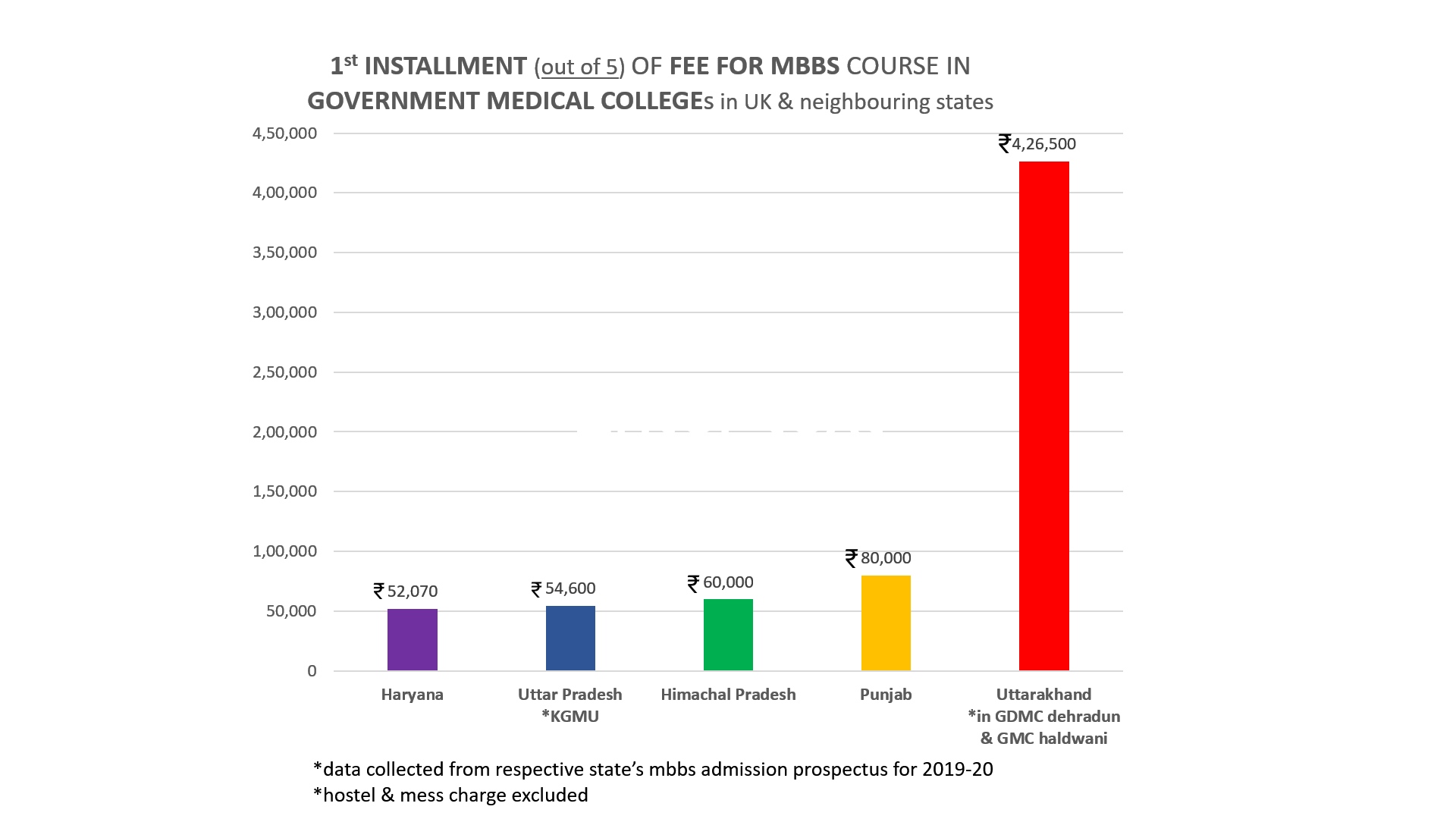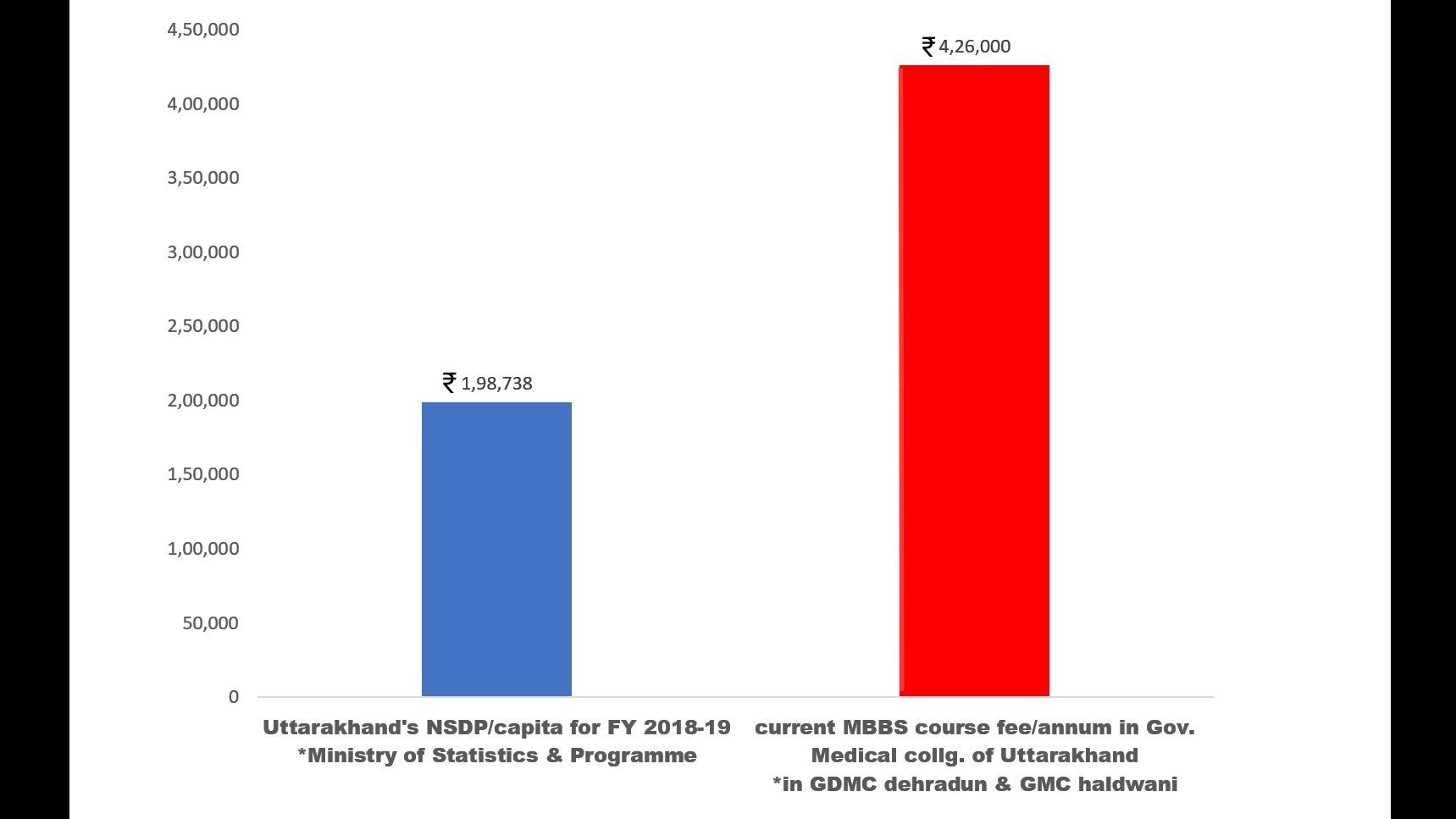Uttarakhand govt hikes MBBS fee by 8 times; Appeals for revocation fall on deaf ears
The annual fee for MBBS students in two major government medical colleges in the state has been hiked by over eight times. This move will make it impossible for students from low-income backgrounds to pursue medicine.

The Uttarakhand government, in June 2019, removed the provision for bond that enabled medical students to pursue the MBBS (Bachelor of Medicine, Bachelor of Surgery) course from Dr Susheela Tiwari Government Medical College in Haldwani and Government Doon Medical College in Dehradun at a subsidised fee of Rs 50,000 per year.
The fee was increased over eight times, to Rs 4,26,000 per year, taking the total course fee to over twenty lakh rupees. The students are required to pay the revised fee by July 31, 2020.
The bond system, however, is being continued in Srinagar Medical College, Garhwal, so that in case of future need of doctors in hilly areas, they may be provided from the institution.
The bond system in Uttarkhand
After the formation of a new state in 2000, the Uttarakhand government introduced the bond system in government medical colleges to promote medical facilities in hilly areas. As per this system, the MBBS students studying in the state medical colleges had to serve in hilly areas of the state for five years in lieu of low fees. As per the agreement, the fees for students accepting the bond was Rs 15,000. Students who opted out of the bond had to pay Rs 2.5 lakh in course fee. This fee was increased over a period of time to Rs 50,000 and Rs 4,20,000, respectively, by 2010.
The Uttarakhand government scrapped the bond system last year, declaring the number of doctors required in the hilly areas has been met. On June 26, 2019, the state government withdrew the bond system from the two major medical colleges and set the fee of Rs 4,26,000 for every student.
Fee hike may end the dreams of many medical students
The unprecedented fee hike has put immense pressure on the students and their parents. Add to it, the mental trauma of dealing with a pandemic and the subsequent stringent measures to combat it, including a nationwide lockdown.
Kamal Gahtori, from the hilly district of Champawat in Uttarakhand, is one such student. He is pursuing the MBBS course at Government Medical College, Haldwani. His father, a daily-wage labourer, provides for the family with his wages and from the income from some farmland he owns. Kamal studied hard for two years after Class XII to secure a government seat in the medical college, ensuring the family will not have to face any monetary problem in seeking admission. Kamal performed well in the state’s NEET 2019 examination as well.
But, the Uttarakhand government order hiking the fee, just before counselling and admission, shocked the aspiring medical student and his family. Fear of losing the prized medical seat forced parents to manage money to secure admission for their kids.
Kamal’s father arranged the required sum by borrowing from relatives and mortgaging the farmland. Hundreds of low-income background families did the same by taking loans, mortgaging land, and borrowing from friends. Some unlucky yet deserving students, whose parents could not arrange the required amount of money, had to let their dream of studying medicine die.
Subhash Singh of Pantnagar was one such student who could not secure an MBBS seat, despite securing a good rank in NEET, in the state due to the fee hike.
Shraddha Tiwari, a student of government medical college, Haldwani told Gaon Connection that she knew many students like Singh who could not be admitted due to the sudden fee hike. Shraddha and her brother joined the MBBS course last year.
“Last year, our parents somehow managed funds for our admission but, it is not possible for them to spend about Rs 9 lakh on course fee every year. We want the government to understand our limitations and reduce our fees,” she said.
“Despite both our parents being in government school teachers, they are struggling to pay the fees. Think of students whose parents don’t have permanent jobs or are dependent on income from farming, wages, shops, or some other small business,” Shraddha pointed out.
“This is absolutely unfair,” raged Bhavneet Sharma, a second-year student at Doon Medical College, Dehradun. His father runs a small daily-need store that suffered a severe setback in business during the lockdown. The annual fee of more than four lakh rupees will be very difficult for his family to pay under the current circumstances.
Medical education in Uttarakhand costlier than neighbouring states
The annual fee in most government medical colleges in the country is between Rs 50,000 and Rs 1,00,000 on average. Many medical colleges have annual fees as low as a few hundreds or thousands of rupees.

For instance, Maulana Azad Medical College, Delhi charges an annual fee of Rs 240. The government medical colleges in Tamil Nadu charge an annual fee of Rs. 4,000. If we look at the states around Uttarakhand – Haryana, Uttar Pradesh, Himachal Pradesh, and Punjab, the annual fee is Rs 52,000, Rs 54,000, Rs 60,000, and Rs 80,000, respectively.
However, from this session onwards, the Punjab government may also hike the medical fee by about 80 per cent, to Rs 1,60,000 per annum.
Can education loans save aspiring medical students?
“The government is not paying any attention to our demand to revoke the fee hike. An education loan seems to the be the only option,” Kamal told Gaon Connection. The State Bank of India he approached for an education loan asked for his father’s farm and house ownership documents as security.
The rural students are unable to get education loans exceeding a sum of Rs 7,50,000. Under the current mandate, students need over Rs 20,00,000 to complete the MBBS course. Mukul Bameta, an aspiring medical student, informed Gaon Connection that his bank refused to extend a loan of more than 7.5 lakh rupees because his house falls in the rural area.
“80 per cent of aspiring medical students belong to the villages. How will they get the education loans to fund their education,” asked Mukul. His father is a cooperative society employee with just a year of service left.
Mukul is of the opinion that such a fee hike dilutes the fundamental difference between government and private medical colleges. “Medical education, from now on, be the sole privilege of rich students in Uttarakhand. There is absolutely no place for the poor and lower-middle-class students,” he lamented.

Appeals for revocation fall on deaf ears
The affected MBBS students and their parents have been running hashtag campaigns like #WeDemandAReasonableFee and #FeesKamKaroNa on social media for a month now. They have appealed to all concerned officials and ministers in the state, including Chief Minister Trivendra Singh Rawat. The parents also appealed to Ramesh Pokhriyal, India’s HRD minister and former chief minister of Uttarakhand, requesting him to intervene.
All the appeals seem to have fallen on deaf ears.
The students reached out to senior Congress leader and former chief minister of the state, Harish Rawat, and Indira Hridiyesh, leader of Opposition in the Uttarakhand assembly, and state Congress chief Pritam Singh, but all in vain. The Youth Congress in the state, however, supported the demand of the students.
State Youth Congress president Sumittar Bhullar told Gaon Connection that he has been raising the demand of medical students before the government for a long time and that the government is just not willing to listen.
Gaon Connection reached out to Yugal Kishore Pant, additional secretary and director at the state department of health education regarding the issue. “Increasing or reducing the fee is the prerogative of the government and the secretariat. Our job is to collect the fee the government decide and provide medical education to the students, which we are doing,” he said.
Pant refused to provide contact information of officers and ministers responsible. The minister of health education in Uttarakhand is chief minister Trivendra Singh Rawat himself. He could not be contacted.
Gaon Connection tried to contact Amit Negi, the principal secretary of Uttarakhand’s health education department in this regard, but all the calls went unanswered. E-mails were sent to the secretary, director, and the ministry of health education, but we have not gotten any response. The story will be updated if and when they respond.

